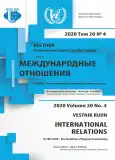Миротворческие операции в Африке и африканская интеграция: современные вызовы
- Авторы: Готтшальк К.1
-
Учреждения:
- Университет Западно-Капской провинции
- Выпуск: Том 20, № 4 (2020): Новые параметры регионального миротворчества
- Страницы: 678-686
- Раздел: ТЕМАТИЧЕСКОЕ ДОСЬЕ
- URL: https://journal-vniispk.ru/2313-0660/article/view/320252
- DOI: https://doi.org/10.22363/2313-0660-2020-20-4-678-686
- ID: 320252
Цитировать
Полный текст
Аннотация
Об авторах
Кит Готтшальк
Университет Западно-Капской провинции
Email: kgottschalk@uwc.ac.za
политолог, сотрудник (на пенсии) факультета политических исследований Белвилл, ЮАР
Список литературы
- Adebajo, A. (2016). A Tale of Three Cassandras: Jean Monnet, Raul Prebisch, Adebayo Adedeji. In: Levine, D.H. & Nagar, D. (Eds.). Region-Building in Africa. Political and Economic Challenges. New York: Palgrave Macmillan. P. 53-67.
- Alvarez, J. (2005). International Organisations as Law-Makers. Oxford: Oxford University Press.
- Devon, C. (2013). The Contested Politics of Peacebuilding in Africa. In: Curtis, D. & Dzinesa, G.A. (Eds.). Peacebuilding, Power and Politics in Africa. Athens, Ohio: Ohio University Press. P. 1-31.
- Edozie, R. & Gottschalk, K. (2014). The African Union’s Africa: New Pan-African Initiatives in Global Governance. East Lansing: Michigan State University Press.
- Fioramonti, L. & Mattheis, F. (2016). Is Africa Really Following Europe? An Integrated Framework for Complementary Regionalism. Journal of Common Market Studies, 54 (3), 1-17. URL: https://papers.ssrn.com/sol3/papers.cfm?abstract_id=2764560 (accessed: 10.06.2020).
- Gathii, J. (2011). African Regional Trade Agreements as Legal Regimes. Cambridge: Cambridge University Press.
- Gottschalk, K. (2012). The African Union and its Sub-Regional Structures. Journal of African Union Studies, 1 (1), 9-39.
- Gottschalk, K. (2018). Persistent Problems in African Integration and Peace-keeping. Journal of African Union Studies, 7 (3), 67-89. doi: 10.31920/2050-4306/2018/V7n3a4
- Irungu, E. (2014). The African Union and African Regional Integration. R/evolutions Global Trends & Regional Issues, 2 (1), 238-249.
- Landsberg, C. (2013). Peace-building as Governance. The Case of the Pan-African Ministers Conference for Public and Civil Service. In: Curtis, D. & Dzinesa, G.A. (Eds.). Peacebuilding, Power and Politics in Africa. Athens, Ohio: Ohio University Press. P. 121-139.
- Levine, D. & Nagar, D. (Eds.). (2016). Region-Building in Africa. Political and Economic Challenges. New York: Palgrave Macmillan.
- Levitt, J. (2012). Illegal Peace in Africa. An Inquiry into the Legality of Power-Sharing with Warlords, Rebels, and Juntas. Cambridge: Cambridge University Press.
- Maloka, E. (2019). When Foreign becomes Domestic. The Interplay of National Interests, Pan-Africanism, and Internationalism in South Africa’s Foreign Policy. Johannesburg: Ssali Publishing House.
- Mangeni, F. & Juma, C. (2018). Emergent Africa. Evolution of Regional Economic Integration. Terra Alta, WV: Headline Books.
- Momodu, R. (2018). Nationalism Underpinned by Pan-Regionalism: African Foreign Policies in ECOWAS in an Era of Anti-Globalization. In: Warner, J. & Shaw, T. (Eds.). African Foreign Policies in International Institutions. New York: Palgrave Macmillan. P. 95-112.
- Murithi, T. (2012). The African Union and the Libya Crisis: Situating the Responsibility to Protect in Africa. Journal of African Union Studies, 1 (1), 83-88.
- Nathan, L. (2013a). The Disbanding of the SADC Tribunal: A Cautionary Tale. Human Rights Quarterly, 35 (4), 870-892. doi: 10.1353/hrq.2013.0059
- Nathan, L. (2013b). Synopsis of Community of Insecurity: SADC’s Struggle for Peace and Security in Southern Africa. African Security Review, 22 (3), 181-189. doi: 10.1080/10246029.2013.822667
- Ojielo, O. et al. (2017). Journey to Extremism in Africa: Drivers, Incentives and the Tipping Point for Recruitment. United Nations Development Programme Report, 1-113.
- Palmateer, G. & Clark, J. (2018). The Uses (and Abuses) of the Economic Community of Central African States. The Hidden Functions of Regional Economic Community Membership for African Regimes. In: Warner, J. & Shaw, T. (Eds.). African Foreign Policies in International Institutions. New York: Palgrave Macmillan. P. 127-148.
- Schouten, P., Murari, J. & Kubya, S. (2017). “Everything That Moves Will Be Taxed”: The Political Economy of Roadblocks in North and South Kivu. IPIS/DIIS Report, 1-66.
- Solomon, H. (2015). Critical Terrorism Studies and its Implications for Africa. Politikon. South African Journal of Political Studies, 42 (2), 219-234. doi: 10.1080/02589346.2015.1041671
- Taylor, R. (2014). Regional Governance in Africa. R/evolutions Global Trends & Regional Issues, 2 (1), 220-237.
- Tieku, T. (2017). Governing Africa: 3D Analysis of the African Union’s Performance. Lanham: Rowman and Littlefield.
- Vines, A. (2013). A Decade of African Peace and Security Architecture. International Affairs, 89 (1), 89-109. doi: 10.1111/1468-2346.12006
- Zajontz, T. & Leysens, A. (2015). Regionalism Revisited: A Critical-reflectivist Framework for Engaging the Changing Nature of Developing Regionalisms in Africa. Politikon. South African Journal of Political Studies, 42 (3), 299-323. doi: 10.1080/02589346.2015.1104465
Дополнительные файлы









